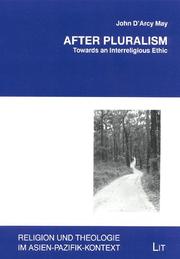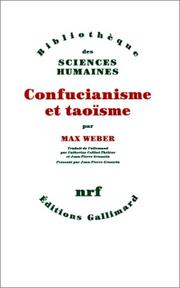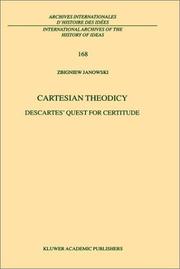| Listing 1 - 3 of 3 |
Sort by
|

ISBN: 3825845273 9783825845278 Year: 2000 Publisher: Münster: Lit,
Abstract | Keywords | Export | Availability | Bookmark
 Loading...
Loading...Choose an application
- Reference Manager
- EndNote
- RefWorks (Direct export to RefWorks)
Religions --- Pluralisme religieux --- Religion et morale --- Relations internationales et culture

ISBN: 2070739392 9782070739394 Year: 2000 Publisher: Paris Gallimard
Abstract | Keywords | Export | Availability | Bookmark
 Loading...
Loading...Choose an application
- Reference Manager
- EndNote
- RefWorks (Direct export to RefWorks)
Confucianisme et taoïsme est l'un des volets de la grande trilogie consacrée par Max Weber à « l'éthique économique des religions mondiales », entre 1915 et 1920, avec Hindouisme et bouddhisme et Le Judaïsme antique. Dix ans après L'Éthique protestante et l'esprit du capitalisme, ces études comparatives s'efforcent d'éclairer l'originalité occidentale par le dehors. Elles reprennent le problème du lien entre le protestantisme ascétique et le développement d'un capitalisme bourgeois rationnel à partir de configurations religieuses et sociales profondément différentes. Chacun de ces cas permet d'interroger la façon dont « la prise de position pratique à l'égard du monde » impliquée dans l'action religieuse retentit sur les « conduites de vie » et, en particulier, sur les comportements économiques. C'est spécialement vrai de Confucianisme et taoïsme dont le dernier chapitre, « Confucianisme et puritanisme », constitue l'un des exposés les plus vigoureux et les plus aboutis de la thèse wébérienne. Mais, au-delà de sa problématique d'origine, Confucianisme et taoïsme reste un modèle d'analyse de la formation et du fonctionnement d'une mentalité à l'échelle d'une civilisation. L'examen de la bureaucratie chinoise et du type de l'État patrimonial est de premier intérêt pour le politiste, comme le chapitre dédié au « corps des lettrés » constitue l'un des textes de base de la sociologie des intellectuels. C'est dire que, indépendamment de la connaissance de la Chine et de la science des religions, c'est un authentique classique des sciences sociales au XXe siècle qui est ici rendu accessible au lecteur français.
Confucianism --- Sociology, Confucian --- Economics --- Confucianisme --- Sociologie religieuse --- Economie politique --- History of doctrines --- Relations --- Taoism --- Religious aspects --- Histoire des doctrines --- Ralations --- Taoïsme --- Aspect religieux --- China --- Religion --- S12/0820 --- China: Philosophy and Classics--Comparative philosophy --- Confucian sociology. --- Taoïsme --- China - Religion --- Économie politique et religion. --- Religion et morale. --- Religions --- Sociologie.

ISBN: 079236127X 1402002572 9401091447 9780792361275 Year: 2000 Volume: 168 Publisher: Dordrecht ; Norwell, MA : Kluwer,
Abstract | Keywords | Export | Availability | Bookmark
 Loading...
Loading...Choose an application
- Reference Manager
- EndNote
- RefWorks (Direct export to RefWorks)
Almost all interpreters of Cartesian philosophy have hitherto focused on the epistemological aspect of Descartes' thought. In his Cartesian Theodicy, Janowski demonstrates that Descartes' epistemological problems are merely rearticulations of theological questions. For example, Descartes' attempt to define the role of God in man's cognitive fallibility is a reiteration of an old argument that points out the incongruity between the existence of God and evil, and his pivotal question `whence error?' is shown here to be a rephrasing of the question `whence evil?' The answer Descartes gives in the Meditations is actually a reformulation of the answer found in St. Augustine's De Libero Arbitrio and the Confessions. The influence of St. Augustine on Descartes can also be detected in the doctrine of eternal truths which, within the context of the 17th-century debates over the question of the nature of divine freedom, caused Descartes to ally himself with the Augustinian Oratorians against the Jesuits. Both in his Cartesian Theodicy as well as his Index Augustino-Cartesian, Textes et Commentaire Janowski shows that the entire Cartesian metaphysics can - and should - be read within the context of Augustinian thought.
Certainty --- Certitude --- Zekerheid --- Zekerheid (Filosofie) --- Zekerheidsprobleem --- Théodicée --- Contributions in theodicy. --- -Evil, Problem of (Theology) --- Indubitability --- -Permissive will --- -Contributions in theodicy --- Theodicy --- Knowledge, Theory of --- Logic --- Truth --- Evil, Problem of (Theology) --- God --- Permissive will of God --- Problem of evil (Theology) --- Good and evil --- History of doctrines --- Permissive will --- Will, Permissive --- Descartes, René, --- Descartes, Renatus --- Cartesius, Renatus --- Descartes, René --- Descartes, René, --- Théodicée --- Histoire des doctrines --- Contributions in theodicy --- 17th century --- Modern philosophy. --- Philosophy. --- Metaphysics. --- Epistemology. --- Modern Philosophy. --- History of Philosophy. --- Epistemology --- Theory of knowledge --- Philosophy --- Psychology --- Ontology --- Philosophy of mind --- Mental philosophy --- Humanities --- Modern philosophy --- Theodicy - History of doctrines - 17th century --- Descartes, René, - 1596-1650 --- Descartes, rene (1596-1650) --- Religion et morale
| Listing 1 - 3 of 3 |
Sort by
|

 Search
Search Feedback
Feedback About UniCat
About UniCat  Help
Help News
News